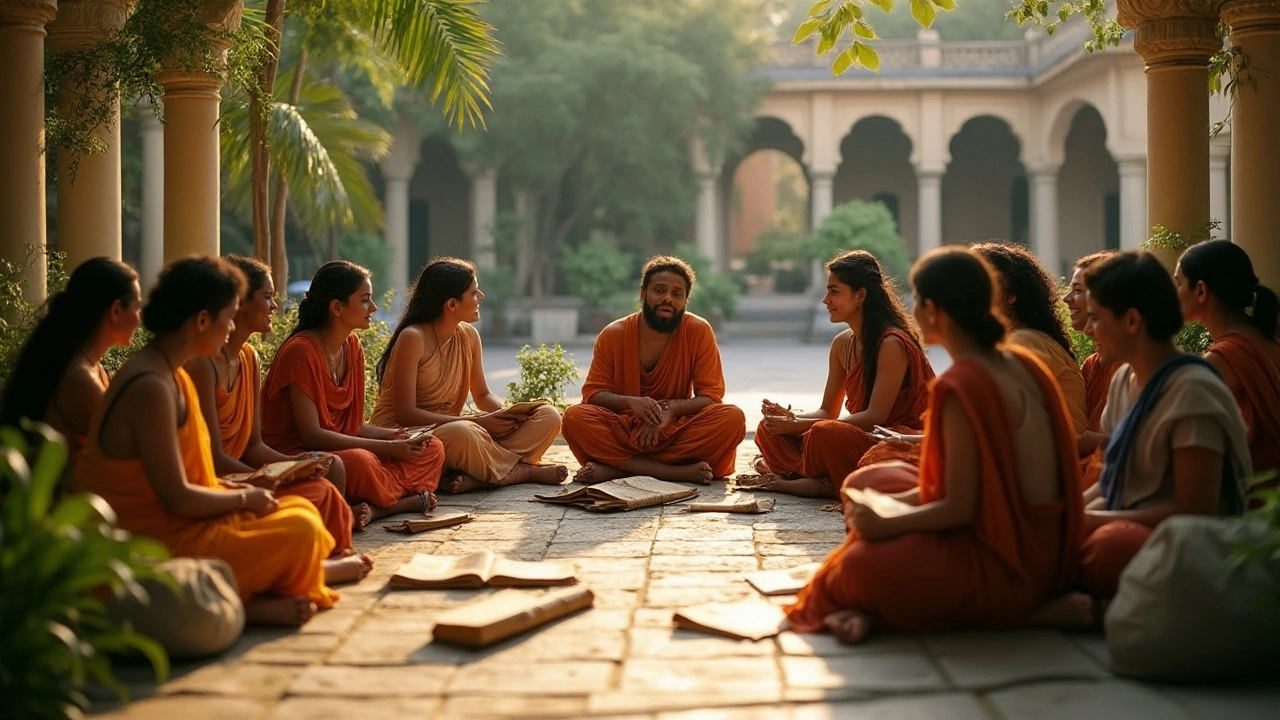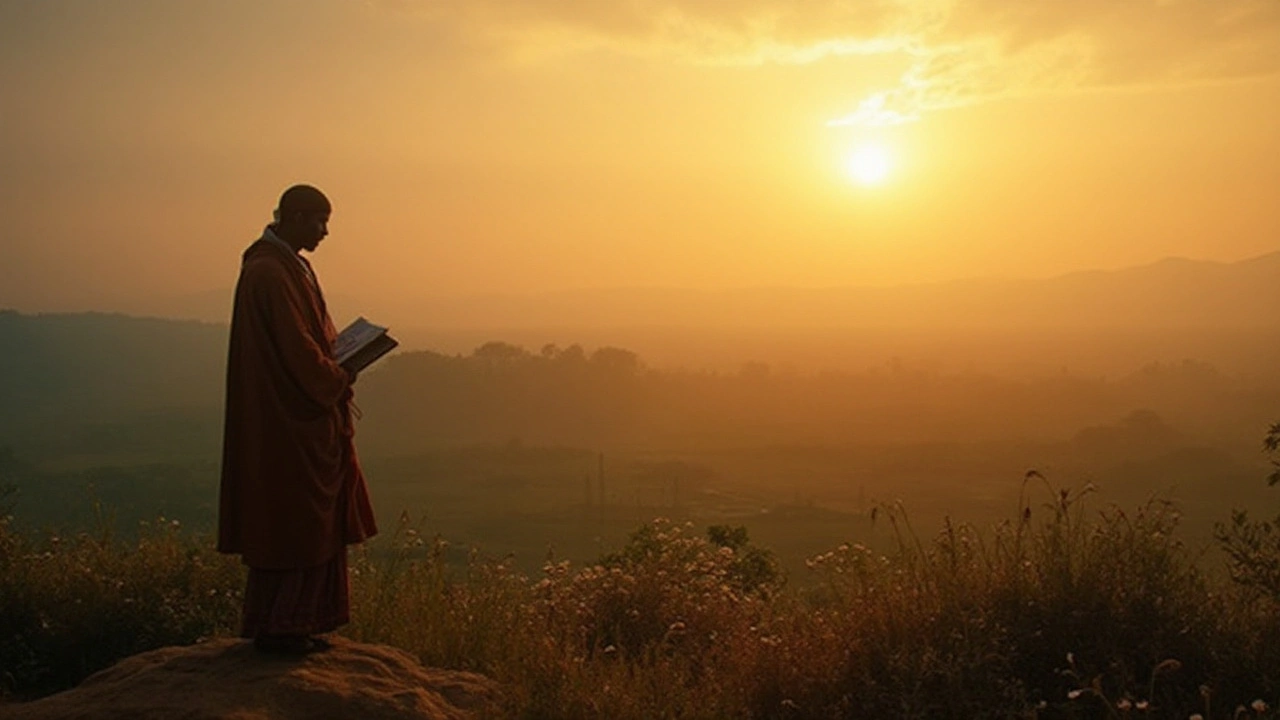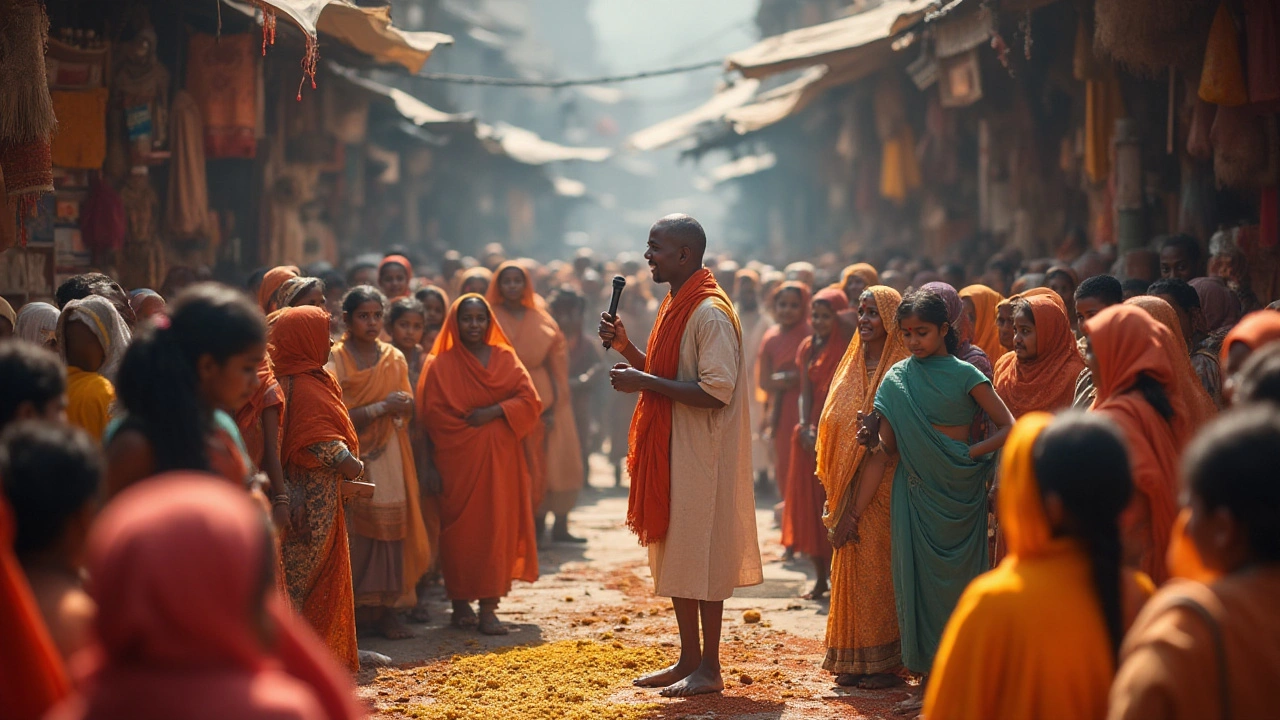Discovering India's Most Beautiful Short Poem
 Dec, 9 2024
Dec, 9 2024
In the realm of poetry, brevity is not just economical but often profoundly powerful. Indian short poetry, with its millennia-spanning tradition, offers glimpses of life's vast complexities in just a few lines. These poems are the pearls of literature that capture intricate emotions and wisdom in short, memorable verses.
The most beautiful short poem ever written? It's a question that invites subjective reflections, yet anyone familiar with Indian literature might find themselves gravitating towards certain pieces that resonate universally. This isn't merely about the arrangement of words but about how each poem stands as a testament to the culture, philosophies, and emotions of the land. Join us as we unfold the tapestry of India's short poetic wonders and spotlight a piece that, for many, holds a special place in their hearts.
- The Essence of Short Poetry
- Historical Context of Indian Short Poems
- Themes in Indian Short Poetry
- A Closer Look at a Beautiful Short Poem
The Essence of Short Poetry
Short poetry is an art form that distills the vast complexities of human experience and emotions into just a few lines. It is remarkable how succinctly poets capture profound truths, creating an impact far beyond the simple appearance of their work. It's a dance with words where every syllable carries weight, every word is carefully chosen, and nothing is superfluous. This precise use of language is what marks the mastery involved in crafting Indian short poems. In essence, a short poem embodies the spirit of minimalism, where less is truly more and absence often speaks louder than presence.
The tradition of short poetry in India traces back centuries, with forms like Haikus, Dohas, and couplets playing pivotal roles in its literary history. These brief compositions demand the poet to express a universe of emotion within the confines of a tiny canvas. The power of short poetry lies not only in what is said but in what it suggests, leaving ample room for the reader's imagination and introspection. This interaction between the poem and its reader is where the magic happens, transforming the act of reading into a deeply personal experience.
The ability to evoke vivid imagery and profound sentiments with brevity speaks to the poet's skill in harnessing the essence of language. Consider Rabindranath Tagore, whose writing epitomizes this succinct beauty. According to him, the challenge lies in writing a poem that can "strip away all adornments" and focus on the heart of the matter. A well-crafted short poem is like a photograph that captures a thousand words; it is a vessel for deeper understanding, not a full picture, yet it tells a complete story in its incompleteness.
"Poetry is when an emotion has found its thought and the thought has found words." - Robert FrostThis quote encapsulates the elegance and depth that short poems strive for. They provide a glimpse into the soul, a moment frozen in time, urging readers to pause and reflect. Especially in Indian literature, where diverse cultures and languages contribute to a rich tapestry of expressions, short poetry remains a testament to its enduring ability to touch the core of human consciousness.
In the landscape of literature, short poems are often underestimated, yet they possess a timeless strength. Their brevity does not undermine their profundity; instead, it enhances it. Composers of these works skillfully maneuver within the limits of form to reveal universal truths, often relying on symbolism and metaphor. By doing so, they invite readers to embark on a journey of interpretation. In today's fast-paced world, where time is precious, short poetry offers solace — a moment to pause and connect with something greater than ourselves, revealing life's beauty through the poet's lens.

Historical Context of Indian Short Poems
The journey of Indian literature, particularly the evolution of short poetry, is as ancient as the land itself. These poems have been an integral facet of India's literary expression, influencing minds and emotions across generations. The origins of short poetry in India can be traced back to the Vedic times, where verses known as 'shlokas' were composed in the sacred texts of the Vedas. These writings were not merely religious chants but often carried profound philosophical questions and reflections about life, the universe, and the human experience itself.
With the arrival of classical Sanskrit literature, short-form poetry began to flourish in the works of poets like Kalidasa, whose epigrams and verses subtlety captured the delicate nuances of life and love. The Tamil Sangam literature, which existed around 300 BCE to 300 CE, included many short poems that delved into the realms of nature, love, and valor. This period marked a vibrant chapter where poets etched the simplicity of routine life into lines that resonated deeply with human emotions.
"The best poetry is that which speaks the truth in fewest words." - Tagore
As centuries passed, the Bhakti movement brought a new wave of religious and devotional short poetry. Saints and poets like Kabir and Mirabai composed succinct yet profound verses addressing themes of divine love and human devotion. Not confined to any particular language, this movement saw the rise of poetry in various Indian languages including Hindi, Marathi, and Gujarati, making it accessible to the common man and allowing the beauty of short poetic masterpieces to flourish.
From Tradition to Modernity
The late 19th and early 20th centuries were transformative phases for Indian short poems, transitioning towards modern themes while retaining traditional charm. This era ushered in poets like Rabindranath Tagore whose short poems in the Gitanjali were inspired by both Western and Indian influences, integrating modernity with timeless cultural ethos. His work was pivotal, earning global recognition and even a Nobel Prize for Literature, showcasing the universal appeal of what crafted Indian short poetry could achieve.
As the Indian subcontinent experienced major sociopolitical changes, poets used short poetry as a tool of expression during struggles for independence. It became a medium to evoke patriotism and subtle defiance against colonial rule. In post-independence India, poets like Kamala Das and A.K. Ramanujan furthered the spirit of short poetry, crafting concise verses that sought to articulate evolving cultural identities and personal introspections in a rapidly changing world.
The historical context of Indian short poems is a testament to the country’s rich tapestry of languages, dialects, and ethnic diversity. Whether it is through classical forms or contemporary expressions, these poems capture the vibrant chorus of voices that define India. Understanding this context allows us to appreciate not just their aesthetic beauty but also their capacity to mirror the dynamic life and ethos of an ancient civilization evolving in modern times.

Themes in Indian Short Poetry
Indian short poetry is a treasure trove of emotions, ideas, and cultural reflections. These poems, often with just a handful of words, have been instrumental in conveying some of the deepest and most complex themes. A prevalent theme in Indian poems is love, not just the passion between individuals, but also the inherent love for nature, the divine, and the self. The famous works of poets like Kabir and Mirabai explore the unconditional love for a higher power, often blurring the lines between human and divine love.
Another significant theme is spirituality and transcendence. Indian short poetry frequently delves into life's purpose, offering wisdom and solace. The verses serve as guiding lights that encourage introspection and foster a sense of peace. Spiritual themes are especially prominent in the poetry emanating from the Bhakti and Sufi movements, which communicate profound philosophical ideas with simplicity and clarity.
The impact of culture and heritage is unmistakably woven into the fabric of Indian short poetry. The poets have a remarkable ability to encapsulate the ethos of Indian society, drawing inspiration from the vibrant tapestry of traditions, rituals, and everyday life. They mirror the joys and struggles of ordinary people, chronicling cultural narratives over centuries. Tagore's short verses often reflect the spirit of renaissance and cultural resurgence, capturing societal changes with elegance.
"Where the mind is without fear and the head is held high; Where knowledge is free; Where the world has not been broken up into fragments by narrow domestic walls." — Rabindranath Tagore
Seasonal and natural elements are also prominent themes in short poetry from India. Poets have been inspired by the monsoon rains, the blooming of flowers, and the transition of seasons, using these motifs to express human emotions. The nature imagery in their verses adds a sensory dimension, drawing readers into the scene with imagery that is vivid yet succinct. These poems bridge the connection between human emotions and the natural world, illustrating life's ebb and flow through nature's lens.
Finally, the theme of mortality and the passage of time is central to many Indian short poems. The brevity of these verses often mirrors life's fleeting moments, capturing the transient beauty and inevitable decay that accompany them. The poetry wades into existential musings, pondering life's impermanence with grace and acceptance. Through these themes, Indian short poetry continues to resonate across generations, offering timeless reflections on human existence.

A Closer Look at a Beautiful Short Poem
When considering the most beautiful short poetry in the world of Indian literature, one cannot overlook the delicate yet profoundly impactful verses of Rabindranath Tagore. Known for his pioneering works that transcend cultural boundaries, Tagore's short poems are masterpieces that explore universal themes with a simplicity that belies their depth. A particular piece that stands out is from his acclaimed collection 'Stray Birds'. This microcosm of poetic brilliance is lauded for its philosophical depth and emotive power packed into just a few lines.
Tagore’s ability to weave complex sentiments into succinct verses serves as a testament to his literary genius. One of his short poems from 'Stray Birds' reads, "Let me not pray to be sheltered from dangers, but to be fearless in facing them. Let me not beg for the stilling of my pain, but for the heart to conquer it." This verse reveals not only his mastery of language but also his deep understanding of the human spirit's resilience. In this poem, Tagore captures the essence of courage and fortitude, projecting an imprint of strength that pushes against adversity, making a lasting impact on readers from all walks of life.
What makes Tagore's short poems particularly irresistible is the flawless blend of cultural introspection and universal human experiences. Such works elevate short poetry beyond mere words, presenting as philosophical reflections or meditations rather than just brief narrations. His words are not only a reflection of Indian societal structures but also provide a window into the soul, making them resonate widely. As Tagore himself once noted, "Words have weight and something of the artist’s touch is felt in their meaning."
"Where the mind is without fear and the head is held high; Where knowledge is free," - Rabindranath Tagore
A significant aspect of short poetry like Tagore’s is its accessibility. These poems are more than just literary works; they are tools of introspection and inspiration. The brevity allows them to ingrain themselves into the memory easily, making them powerful vessels of personal and cultural identity. The minimalist approach does not deter its profundity; rather, it enhances the listener's ability to infuse personal meaning and emotion into the interpretation. This results in a shared but individualized experience that appeals to a broad spectrum of readers.
The impact of short poetry, especially such pieces from Indian poems, extends beyond the boundaries of language and culture. They are a testimony to India's rich literary heritage that upholds traditional values while fostering innovation and modern thought. Readers often find themselves reflecting on these themes in their daily lives; concepts such as love, morality, courage, and the human connection stand at the forefront. Short poems from India, thus, are not mere collections of words but are profound statements on life itself. It is the cultural specificity coupled with universal applicability that makes them stand out as a beloved corner of global literature.